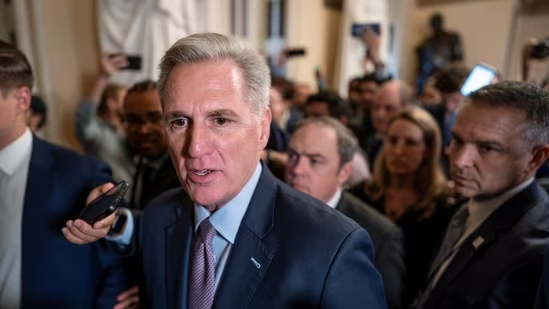The sacking of Kevin McCarthy will make supporting Ukraine harder
Kevin McCarthy’s stint as speaker of America’s House of Representatives ended the way it had begun: in utterly humiliating fashion. Members of the lower chamber of Congress disposed of their leader for the first time in American history on October 3rd. Despite earning support from 210 of the 221 House Republicans, eight hardliners teamed up with 208 Democrats to fire Mr McCarthy. Shortly thereafter the former speaker announced he would not try to regain the title. The coming weeks are likely to be chaotic, and the results of this chapter of congressional dysfunction will reverberate far beyond Capitol Hill.  PREMIUM
PREMIUM
An embarrassing ejection looked to be on the cards as soon as Mr McCarthy won the speaker’s gavel in January. As part of a deal with recalcitrant Republicans after 15 rounds of voting, Mr McCarthy agreed to allow a single congressman, at any time, for any reason, to call a vote for his removal as speaker. Matt Gaetz, an elaborately coiffed representative from Florida, had threatened to use the so-called motion to vacate for some time. Mr McCarthy’s recent dealmaking with Democrats to avoid a government shutdown pushed Mr Gaetz over the edge.
“You all know Matt Gaetz. You know it was personal,” Mr McCarthy said at a press conference after being ousted. Mr Gaetz denies that personal pique drove his fight against the former speaker, but the Florida Republican has faced a long-running House Ethics Committee inquiry into alleged sexual misconduct and misuse of funds. No doubt he was not thrilled that Mr McCarthy failed to stop the investigation. Yet the rebel leader probably had a mix of motives for making his move now.
“He’s very, very sharp, very calculated, and very intelligent: a political pro,” says Christian Ziegler, chairman of the Florida Republican Party. “This isn’t someone that’s just doing something uncalculated off the cuff and in the heat of the moment. Everything is very meticulously planned when Matt Gaetz takes action.” Mr Gaetz enjoys the spotlight, and he also raised funds during this fight, which surely made him enemies on Capitol Hill. That is less important for someone who could be eyeing the governor’s mansion in Florida.
For all his faults, Mr McCarthy overcame thin margins during his time in office. In May he managed to persuade the House to raise the debt ceiling, to avoid a damaging default. Then, on September 30th, he pushed through a last-minute bipartisan deal to delay a costly government shutdown. The next speaker may find the job harder still, even without the same baggage that some in the unruly Republican Party felt that Mr McCarthy carried.
The immediate task will be funding the government. The deal to avert a shutdown keeps the government going with a “continuing resolution” (CR) only until November 17th. A Republican strategist, Liam Donovan, reckons Mr Gaetz might be satisfied with Mr McCarthy gone, but other hardliners will not easily accept a long-term funding solution simply because a fresh face is running the House. Government will have to be funded “in a way that is even more anathema to these Republicans than the CR,” Mr Donovan says. Mr McCarthy’s replacement could soon be overseeing a shutdown. Averting a closure could potentially cost the new speaker his job.
Aid for Ukraine, which was not included in the government funding deal in order to placate hardliners, is the greatest concern for those beyond America’s borders. At the press conference announcing his departure, Mr McCarthy compared Vladimir Putin to Adolf Hitler and said the current world reminded him of the 1930s. He reiterated his support for Ukraine and rightly criticised President Joe Biden for his past hesitance in arming the country.
But some House Republicans have begun to oppose further funding. Mr McCarthy suggested a quid pro quo, in which aid for the government in Kyiv could be approved if Democrats help pass policies to shore up America’s porous border. Supporters of Ukraine in Congress, who constitute a clear majority in both chambers, are pushing for a vote that would guarantee funding for the war-torn country up until the 2024 American presidential election. Threading this legislative needle could be even more difficult than avoiding a government shutdown.
To whom that task will fall is not obvious. Patrick McHenry, a North Carolina Republican hand-picked by Mr McCarthy, will serve as acting speaker and will merely oversee the election of Mr McCarthy’s replacement. Republicans are planning for a candidate forum on October 10th and a vote the following day. But the real question is who among the Republicans has the mental fitness to do the job—and is mad enough to seek it.
No one expects a consensus figure to emerge as quickly as, for example, Paul Ryan did when he replaced John Boehner as speaker in 2015. Steve Scalise, the second-ranked House Republican, has thrown his hat in the ring. So has Jim Jordan, chairman of the Judiciary Committee, who has credibility with the right as a former Freedom Caucus chairman who managed to work productively with McCarthy allies. And Kevin Hern leads the Republican Study Committee, which counts a majority of the House Republican Party as members. Yet uncertainty could pave the way for a dark horse. (Marjorie Taylor Greene, a prominent member of the Republican berserker caucus, tweeted that the only candidate she was supporting for speaker was Donald Trump.)
The chaos and intrigue will be as entertaining as any episode of “The West Wing”, a Washington-focused television drama. That will provide little comfort for Americans who want their government to stay open—or for Ukrainians who rely on American power and largesse to sustain their fight for survival.
© 2023, The Economist Newspaper Limited. All rights reserved. From The Economist, published under licence. The original content can be found on www.economist.com
Continue reading with HT Premium Subscription
Daily E Paper I Premium Articles I Brunch E Magazine I Daily Infographics Subscribe Now @1199/year Already Subscribed? Sign In
Disclaimer: The copyright of this article belongs to the original author. Reposting this article is solely for the purpose of information dissemination and does not constitute any investment advice. If there is any infringement, please contact us immediately. We will make corrections or deletions as necessary. Thank you.
Title:The sacking of Kevin McCarthy will make supporting Ukraine harder
Url:https://www.investsfocus.com







